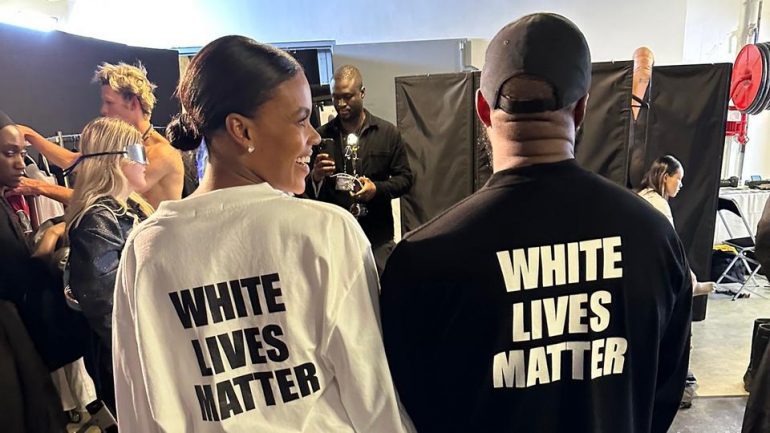
Audience
- Sentiment: Negative
- Political Group: Progressive
- Age Group: 18-34
- Gender: Both
Overview
- Kanye West’s recent offensive remarks about Adolf Hitler have sparked widespread condemnation, particularly from the American Jewish Committee.
- Bill Maher highlighted the serious implications of West’s comments, emphasizing the need for accountability from public figures.
- The article discusses the rising antisemitism and the role of celebrity influence in shaping public attitudes and behaviors.
Kanye West: A Controversial Figure in the Spotlight
Kanye West, a name that sparks conversation and debate, has found himself in the spotlight again, but this time for all the wrong reasons. Recently, he made headlines with a series of controversial and offensive remarks, including a shocking tweet in which he expressed admiration for Adolf Hitler. This incident has led to widespread condemnation, including a response from comedian Bill Maher on his show, Real Time. In this article, we’ll break down what happened, why it matters, and how this reflects broader issues about celebrities and their influence.
The Rant That Shocked Many
Kanye West is no stranger to controversy; he has spent much of his career pushing boundaries and making headlines for his provocative statements. However, this recent series of comments has crossed a new line for many. After his tweet about Hitler, complaints poured in from various groups, but particularly from the American Jewish Committee (AJC), a leading organization that advocates for the Jewish community. They expressed their deep concern about the potential danger of Kanye’s statements, especially given the rising antisemitism that has been witnessed in various parts of the world.
Bill Maher, known for his critical and often humorous take on societal issues, didn’t hold back either. On his show, he expressed dismay about Kanye’s comments and highlighted the serious implications they carry. Maher pointed out that, as a public figure with millions of followers, Kanye’s influence is substantial, and it’s important to hold him accountable for his words and actions.
The Importance of Words
Words have power, and in today’s world, social media amplifies that power even more. Kanye West, with his enormous platform, has the ability to shape opinions and influence behaviors among his fans and followers. For many young people who look up to celebrities, remarks from someone like Kanye can have significant repercussions.
The AJC warned that when celebrities make antisemitic statements, they can perpetuate harmful stereotypes and fuel hatred. They also noted that the rise of antisemitism in recent years has been alarming, with incidents of hate crimes and discrimination increasing in many places around the world. As a society, we need to be vigilant about the messages being sent by influential figures.
The Impact of Celebrity Culture
To put this into perspective, let’s think about the nature of celebrity culture. Young people today are bombarded with images and messages from famous figures through social media platforms like Instagram, Twitter, and TikTok. Celebrities often become role models, and their opinions can sway entire generations. Because of this, it’s crucial for these public figures to understand the responsibilities that come with their fame.
When celebrities like Kanye West make inflammatory remarks, it does more than just draw public outrage; it can lead to real-world consequences. Whether it’s through encouraging intolerance or simply normalizing hateful rhetoric, the influence of a celebrity can have lasting effects. It’s essential for both celebrities and their followers to engage in critical thinking about what is being said and the broader implications of those words.
The Role of Accountability
One key point that arises from Kanye’s latest comments is the importance of accountability. After a previous incident of racism and antisemitism, Kanye did issue an apology to the Jewish community. However, many are questioning whether these apologies are sincere or just a response to public backlash. It raises the question of whether public figures are truly committed to understanding the weight of their words, or if they simply care about public opinion.
In a world where many people are willing to cancel someone based on a single mistake, it becomes clear that accountability is vital. Apologies should not be a one-time thing. They should be part of a larger conversation about understanding and recognizing harmful rhetoric. This is especially true when it comes to issues like racism and antisemitism, which are deeply rooted in society.
The criticism from figures like Bill Maher serves as a reminder that it’s not just about calling someone out for their mistakes but also encouraging growth and learning from them. It’s about fostering a culture where people feel responsible for their words and actions and can learn from their errors without being ostracized forever.
Historical Context
To fully understand the seriousness of Kanye’s remarks, it’s important to look back at history, particularly World War II and the Holocaust. Adolf Hitler led a regime that systematically murdered six million Jews and millions of other marginalized groups during the Holocaust. This horrific event has shaped Jewish identity and memory in profound ways, and any admiration for Hitler can be deeply traumatizing for those affected by these events.
When public figures make light of such history with flippant remarks, it invalidates the experiences and pain of survivors and their families. It’s a reminder of why historical awareness is crucial. Understanding what happened in the past helps us navigate the present and work toward a future where such hate doesn’t thrive.
The Current Climate of Antisemitism
Kanye’s comments come at a time when antisemitism is on the rise. Reports have indicated that hate crimes against Jewish people have surged in various countries, including the United States. This uptick has made many in the Jewish community feel unsafe and targeted. Celebrities, like Kanye, have a responsibility to recognize the impact of their statements in this climate. Their influence can either perpetuate division or foster unity.
Fostering a Better Dialogue
As we navigate these complicated discussions, it’s important to think about how we can foster a better dialogue in our own communities. We can encourage acceptance, understanding, and empathy, regardless of our background.
Here are a few suggestions for how we can engage in conversations about hate:
- Educate Ourselves: Understanding the history of antisemitism and other forms of hate can provide context for discussions. Books, documentaries, and survivor stories can highlight the realities of discrimination.
- Speak Up: If you hear someone making harmful or offensive statements, it’s crucial to address it. It doesn’t have to be confrontational; sometimes a simple question can initiate a thoughtful conversation.
- Promote Positive Role Models: Support celebrities and public figures who use their platforms for good. Highlight those who promote inclusivity and understanding instead of division.
- Engage in Discussions: Seek out discussions within your school, community, or online about how to foster acceptance. Bringing awareness to these issues means more people will understand their importance.
- Listen and Learn: Be open to hearing others’ perspectives, especially those from marginalized communities. Their experiences can provide valuable insights that can shape our understanding and actions.
Final Thoughts
In the end, Kanye West’s comments serve as a crucial reminder of the responsibilities that come with fame and influence. It’s essential for all of us—fans, celebrities, and everyone in between—to reflect on how our words and actions can affect others. The world is watching, and every voice matters.
Now, I’d love to hear from you! What do you think about Kanye West’s recent comments? Do you believe celebrities have a responsibility to be careful with their words? Share your thoughts in the comments below!






